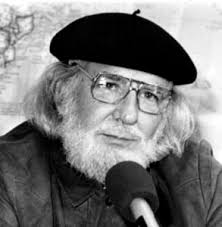
Date of appointment: 2 april 1987.
By proposal of: Faculty of Language Studies, Traslation and Communication.
Date of investiture: 30 april 1987.
Sponsor: Dr. Sonia Mattalia Alonso and Dr. Josep Lluís Sirera Turó.
Ernesto Cardenal Martínez (Granada, Nicaragua, January 20, 1925) is a poet, priest, theologian, writer, translator, sculptor and Nicaraguan politician of world fame, first of all, for his poetic work, which has earned him several international awards. He is recognized as one of the most prominent advocates of liberation theology in Latin America.
He studied first in Managua, and from 1942 to 1946, literature in Mexico; he studied four years at the Faculty of Philosophy and Letters of the National Autonomous University of Mexico.2 Later, from 1947 to 1949, he continued his studies in New York and traveled between 1949 and 1950 through Spain, Switzerland and Italy.
In July of 1950 he returned to Nicaragua, where he participated in the April Revolution of 1954 against Anastasio Somoza García. The coup fails and ends with the death of many of his companions and friends. In 1957 Ernesto Cardenal decided to enter the Trappist Abbey of Our Lady of Gethsemane (Kentucky, United States), where he met the American writer monk Thomas Merton, who was novice master. In 1959 he left the monastery to study theology in Cuernavaca (Mexico). Cardinal was ordained a priest in Managua in 1965 and then founded a Christian community, almost monastic, on one of the islands of the Solentiname archipelago on Lake Cocibolca. There he wrote the famous book The Gospel of Solentiname and founded a community of fishermen and primitivist artists that became world famous. Cardinal spent his vacations in those islands, where he read the complete works of Darío, wrote or directed the Holy Week mass in the small church of the town.
In 1971 he travels to Chile where he meets with President Salvador Allende. According to Cardenal, his visit to the South American country took place on the same day that the news of the Nobel Prize in Literature arrived to Pablo Neruda, a Chilean poet who the Nicaraguan recognizes a great influence in his work and which cost him "get rid" .
Supporter of a "revolution devoid of revenge", Cardenal collaborated closely with the Sandinista National Liberation Front in the struggle against the Somoza regime and was appointed Minister of Culture on the same day of the victory of the Nicaraguan Revolution, July 19, 1979 He held this position until 1987, the year in which the ministry was closed for economic reasons.
Cardinal left the FSLN in 1994, in protest against the leadership of Daniel Ortega, and later gave his moral support to the Sandinista Renovating Movement (MRS) and the MRS Party Alliance during the 2006 elections, as well as other prominent Nicaraguan writers such as Gioconda Belli and Sergio Ramírez Mercado, founder of the MRS.
Awards and distinctions
• Prize of the Peace of the German Book Merchant (1980)
• Mediterranean Foca Recognition - Mediterranean Wave Awards (2005) 12
• Ibero-American Poetry Prize Pablo Neruda (2009)
• Corresponding member of the Mexican Academy of Language (2010)
• Queen Sofia Award for Ibero-American Poetry (2012)
• Doctor honoris causa by the University of Huelva (2012) 13
• Pedro Henríquez Ureña International Award (2014), granted by the Ministry of Culture and the Presidency of the Dominican Republic, received during the opening ceremony of the XVII International Book Fair Santo Domingo 2014 (FILRD), 14 together with the writer Eduardo Galeano From Uruguay.
• Doctor honoris causa by the University of Valparaíso (2014) 15
• Order of the Rubén Darío Cultural Independence by the government of Nicaragua, maximum award and recognition granted by Nicaragua.











